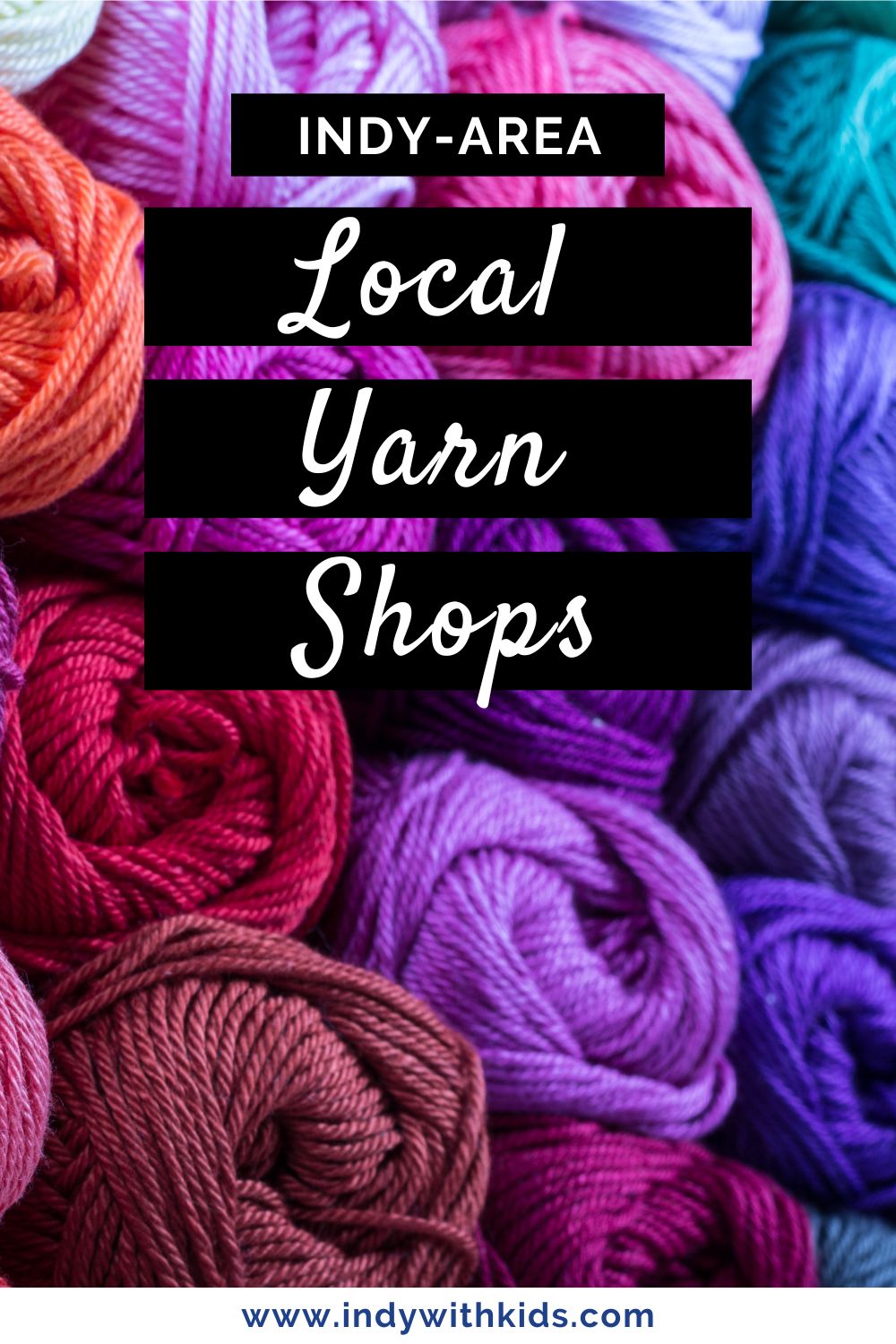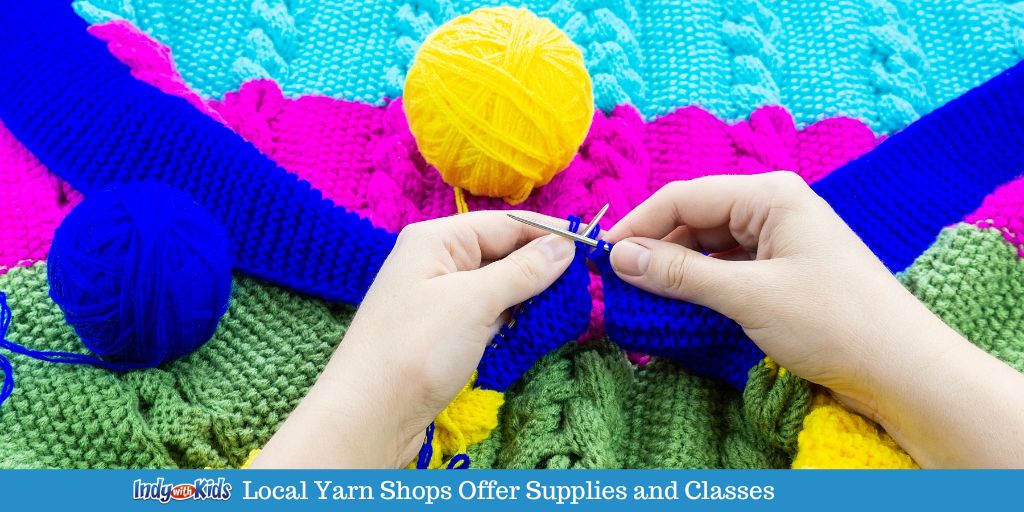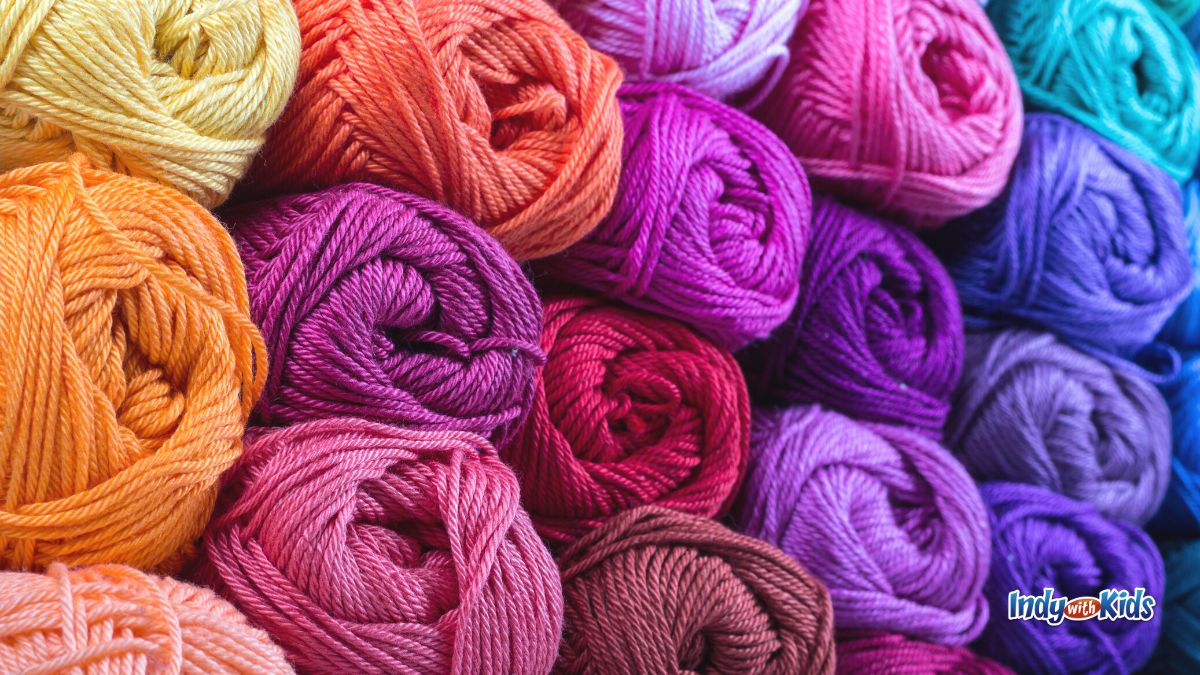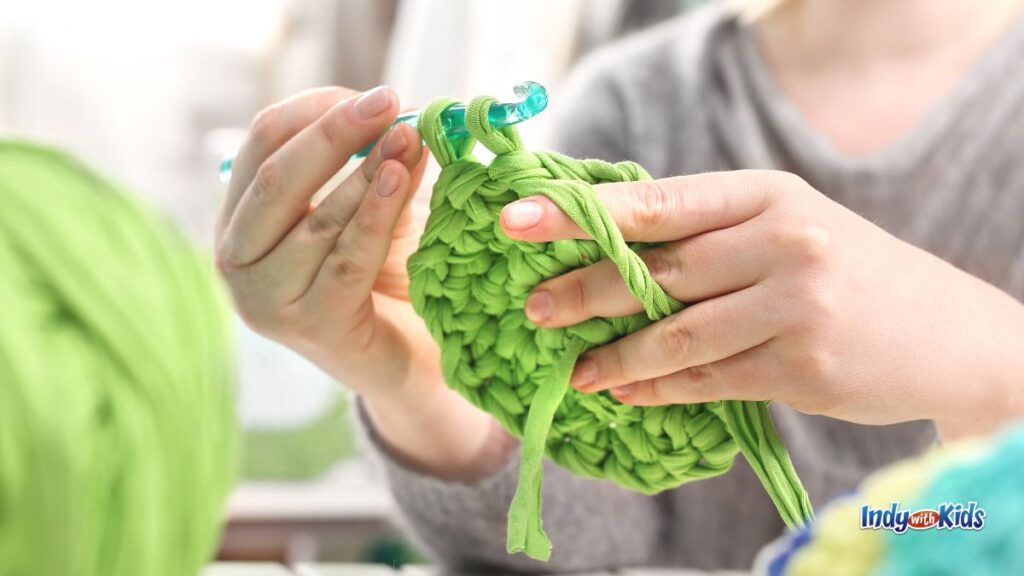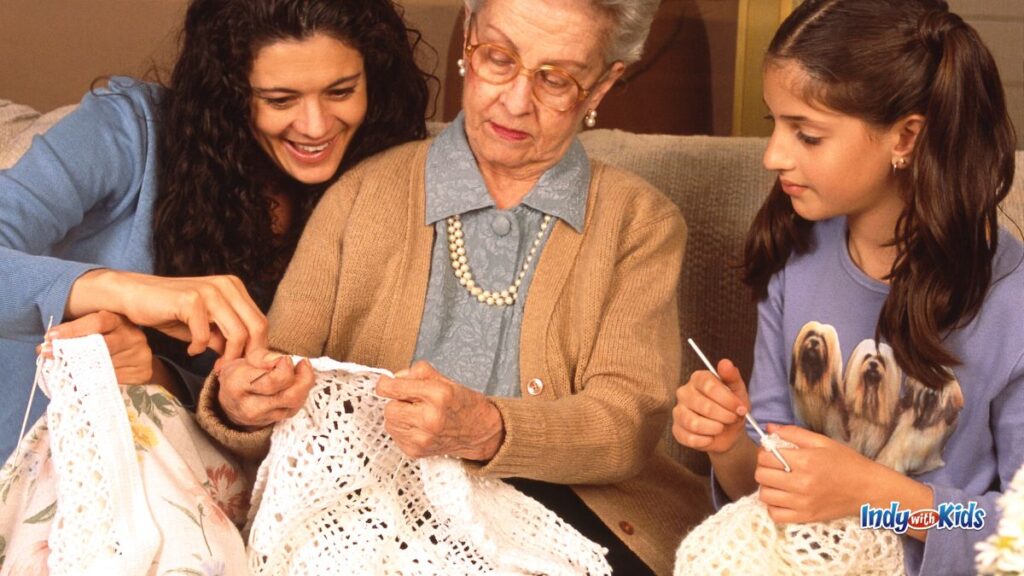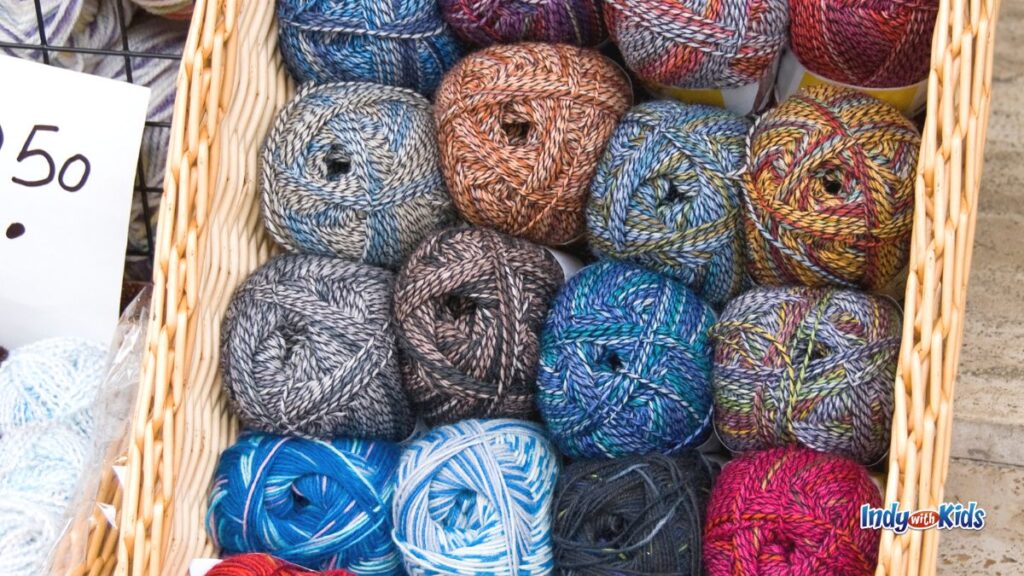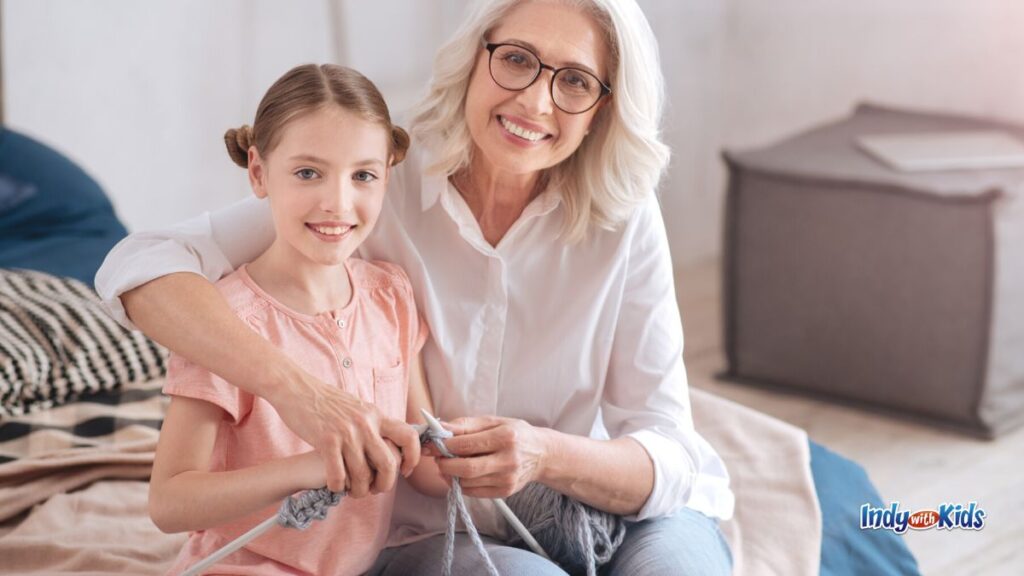Unique, hand-dyed yarns fill baskets. Hand-knit projects drape over cabinets, providing inspiration. Inside local Indianapolis yarn shops, you will find a wonderland of textures, swirls of colors, and an inspiring creative escape.
Kids eight years and older are at the ideal age to start learning how to crochet or knit. In Waldorf schools, knitting is a component of the first-grade curriculum, as it reinforces literacy skills. Much like reading, knitting teaches children to look for patterns while working left to right. In the process, they practice focusing on a task and end up gaining self-confidence. Knitting and crocheting also reinforce math skills, as children count stitches and learn patterns.
Benefits of Knitting and Crochet
- Fine motor skills
- Hand-eye coordination
- Attention skills
- Math skills
- Creativity
- Self-confidence
- Decreased stress
- Patience
- Supportive community
- Opportunities to serve others
While there are plenty of books, kits, and videos available, the best way to learn is with someone who knows the craft. If you do not know anyone who knits or crochets, call a local yarn shop and ask if they have classes for kids. Staff may be willing to offer one-on-one instruction for your child. If possible, I would recommend a parent learn as well, in case the child needs help outside of class.
Tips for Beginners
- Start with a bulky yarn. A bulky yarn will help your child easily hold the yarn and finish a project quickly. There are some yarns that are jumbo-sized and meant for loop or arm knitting. If you want your child to learn with needles, make sure you select the appropriate yarn and corresponding needles. Do not hesitate to ask for help as you shop.
- Choose child-friendly needles. I remember my first knitting attempt when I was about nine years old. I chose pretty purple metal needles that looked great but were too long for my hands to hold and too slippery for my yarn. I learned my lesson the hard way.
Wooden needles are much easier to hold and come in a variety of lengths. Choose needles or a hook that are the correct size for the yarn you select. The length of the needles is also important. Select needles that your child can handle and that are slightly longer than the number of stitches he or she will be casting on. - Shop together. Let your child select his or her color of bulky yarn. This encourages ownership of the project and helps the child become excited about the process.
If purchasing yarn from a yarn shop, note that it might be sold in a skein rather than a ball of yarn. Yarn sold in skeins or hanks must be wound before it can be used. You can wind it by hand or ask for it to be wound in the store before you leave. I recommend having it wound in the store to avoid frustration with tangles and knots. - Select a project that will result in success. I have taught many people how to knit and typically recommend not starting with a scarf. While a scarf is a basic shape, it requires a lot of yarn and time. Begin with a square that can be a blanket for a stuffed animal or a shorter rectangle that can be sewn together to make a cowl.
- Ask for help. Larger stores such as JoAnn, Hobby Lobby, and Michaels offer a variety of craft supplies including yarn, needles, hooks, and kits. But local yarn shops specialize in fibers and have staff who have years of experience with knitting and crocheting.
Most shops offer several classes during the week, drop-in hours, and one-on-one help. I have been knitting for 20 years and still visit local yarn shops and ask for help. Knitting is a process, so take the opportunity to model lifelong learning for your child. - Consider your child’s learning style. What works for one child might not work for another. Rhymes, such as this one describing a knit stitch, may help those who are auditory learners:
Go through the front door
Around the back
Peek through the window,
Off jumps Jack!
Visual learners may prefer to watch someone else knit first or view lessons on YouTube. Encourage your child to use highlighters, washi tape, or other colorful markers to track progress.
One of my favorite parts of fiber arts is the welcoming community. During my last trip to a local Indianapolis yarn store, I saw a mom and her six-year-old daughter seated at a large table in the middle of the room, receiving an individual knitting lesson. As their lesson progressed, the table slowly filled with regulars who sat down to work on their own projects. Soon there were knitters spanning several decades of age, all enjoying the same craft, and engaging in conversation.
There is also a strong spirit of service in the crafting community. Many shops host drives for local hospitals, homeless shelters, and animals in need.
Local Indianapolis Yarn Shops
Mass Ave Knit Shop
A staple in the Indy yarn community, the Mass Ave Knit Shop carries a multitude of yarns, needles, and yarn accessories. Painted murals decorate the outside walls while knit flags, sweaters, and hats decorate the inside. Yarn is organized by weight. Susan, the owner, is a talented knitter and is helpful with yarn selection and projects. The Mass Ave Knit Shop website lists current classes and specials and includes an option for purchasing yarn online.
Black Sheep Yarn and Fiber Arts
Imagine walking into a house where every room is filled with a different type of colorful fiber. Knit and crochet dreams come true walking through the rooms of yarn in this Victorian-style house in Noblesville. Owners Karen and her daughter Marina offer a wealth of knowledge and entertaining videos with project ideas and yarn suggestions on the shop’s Facebook page. Black Sheep Yarn also offers numerous classes teaching basic skills and specific projects.
Village Yarn Company
Located in Zionsville, the Village Yarn Company offers a variety of yarn, needles, and patterns. The shop has couches, chairs, and a large table to gather around. Village Yarn Company provides a variety of classes including several for beginners.
Rebel Purl Yarn Shop
Located in Bloomington, Rebel Purl offers stunning hand-dyed yarns and handcrafted items from local makers. Kids will enjoy the selections that include bright colors, sparkles, and fluorescent yarn that glows under black light. The Rebel Purl website lists store hours plus events such as Craft Night, Movie Night, and Crafternoons. Yarn is also available for purchase on the Rebel Purl website.
The Knitting Otter
A relative newcomer to the fiber community, the Knitting Otter has received a warm welcome in Franklin. The Knitting Otter prides itself on being a friendly place to sit, shop, knit, or crochet. The shop features a variety of in-stock yarns and hosts trunk shows by independent fiber artists. The store website includes store hours and a calendar with classes you can sign up for including beginning knitting and beginning crochet.
AR Workshop
If your child has difficulty knitting with needles or you think they would prefer a fast project, loop knitting might be a good introduction to the craft. AR Workshop offers a loop knitting class at its locations in Carmel and McCordsville. Once you learn the concept, you can purchase super bulky yarn and knit at home. The AR Workshop knitting classes are for ages 12 and older.
Books About Knitting
If you would like to introduce the concept of knitting or crochet to your child, check out this list of knitting and crochet-themed children’s books. Once your child learns some basics and starts on a project, you could pick up a book with patterns.
Extra Yarn by Mac Barnett
Woolbur by Leslie Helakoski
A Hat for Mrs. Goldman by Michelle Edwards
Phoebe’s Sweater by Joanna Johnson
Knitting Pirate by Diane Murray
Knitting Nell by Julie Jersild Roth
Stanley the Amazing Knitting Cat by Emily MacKenzie
Knit Together by Angela Dominguez
Knitty Kitty by David Elliott
Shall I Knit You A Hat? by Kate Klise
Knitting for Peace: Make the World a Better Place One Stitch at a Time by Sayraphim Lothian
